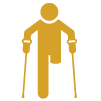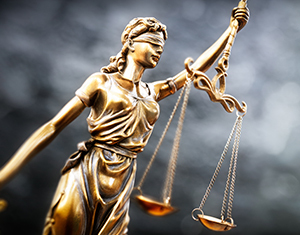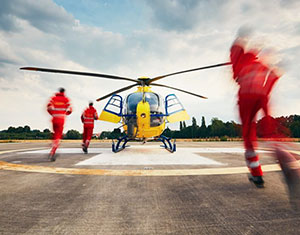A Knowledgeable, Successful Atlanta Attorney for Bicycle Accident Injuries
In the Atlanta metro area, a lot of us are lucky to live in areas like Kirkwood, Krog Street, downtown Decatur, and Alpharetta — neighborhoods that make bike accessibility and use a choice in our daily commutes and exercise routines. While these areas often have designated bicycle lanes, that is not a guarantee of your safety.
What are Bicycle Accidents in Georgia?
Collisions between a motor vehicle and a cyclist can result in extremely serious injuries, and often they can even be deadly.
Bicyclists are expected to follow the same rules of the road as drivers. They can be held responsible for a crash when their failure to use reasonable care results in a crash. However, when bicyclists are involved in collisions with motor vehicles, the motor vehicle occupant is rarely seriously hurt. That’s why you don’t often see motor vehicle drivers suing bicyclists for compensation stemming from collisions.
But the fact of an injury alone isn’t going to be enough to establish liability (the legal responsibility to cover damages) in a bicycle accident injury case. Rather, the primary issue is negligence. Negligence is the absence of reasonable care when one had the duty to engage in it. Drivers all have a responsibility to operate their vehicles with due care. If they are distracted, fail to yield, speed, drive while impaired (drunk), etc., and in turn cause a crash, they can be held legally responsible to cover the costs that result.
Further Reading: Understanding Georgia’s Modified Comparative Fault Rules in Civil Lawsuits
Proving Liability & Causation in Georgia Bicycle Accident Injury Cases
Proving your bicycle accident injury case is essential to winning and getting fair compensation. In order to do so, you will need to establish negligence by showing that:
- A duty of care existed, and the defendant owed you a level of responsibility.
- The defendant breached the duty of care and responsibility.
- That breach directly caused your injuries.
- You suffered damages that resulted from the breach of care.
There are many scenarios in which third-party defendants may find themselves liable for a bicycle accident. As Atlanta injury lawyers can explain, civil claims and litigation for crash injuries aren’t limited to a single defendant, and sometimes those injured in these crashes may claim damages from more than one defendant.
Some examples of third-party liability for a bicycle accident include:
Employer of the Driver
Under the doctrine of respondeat superior (Latin for “let the master answer”), an employer can be held vicariously liable for the negligent conduct of an employee who was acting in the course and scope of employment. We see this often in truck accident cases. There is also the possibility that an employer may be not just vicariously negligent but directly negligent. For instance, if the company failed to properly vet its employees or required workers to be in constant contact via their smartphones, even while driving, they could be held directly negligent.
If the injured person was acting in the course and scope of employment at the time of the accident, they could collect workers’ compensation (which would be their exclusive remedy where their employer was concerned) but also pursue damages against negligent third parties. Their damage award from the latter would be offset by what they’d already received from workers’ compensation (with the workers’ compensation insurer maintaining subrogation rights).
Vehicle Owner/Parent
Owners of vehicles can be liable for a crash even if they weren’t the ones driving. There’s the family purpose doctrine (as outlined in O.C.G.A. 51-2-2). As noted in 2007 by the Georgia Court of Appeals in Hicks v. Newman, the family purpose doctrine imposes liability for the negligence of an immediate family member using the vehicle for a family purpose when a vehicle is maintained by the owner for the use and convenience of his/her family.
Vehicle owners can also be held liable when they give permission for others to use their car (permissive use doctrine), when they negligently entrust the vehicle to another, knowing they may be a danger on the road (negligent entrustment), and even if they fail to take steps to prevent reasonably foreseeable theft, as the Georgia Court of Appeals established in the 1958 case of Roach v. Dozier.
Bar, Restaurant, Nightclub Owner, Social Host.
If an alcohol vendor or social host serves drinks to a person who is either underage or visibly intoxicated, knowing that person is likely to drive from that location, that person/business could be held liable for a bicycle accident under Georgia’s dram shop law.
These are just a few examples of cases where a third party besides the driver could be liable for your bicycle crash injuries. There may well be others, like vehicle manufacturers (defective parts), cities/municipalities (negligent road maintenance), and uninsured/underinsured motorist carriers (for crashes involving “phantom” vehicles). It’s important to consult with an attorney to explore all legal avenues before acting.
Statute of Limitations in Bicycle Accident Cases
Under GA Code § 9-3-33, the statute of limitations holds that injured parties have two years to bring personal injury claims forward. After two years, a court will dismiss your claim. Oftentimes, insurance companies will engage in stalling techniques to avoid paying you anything. It is important to begin working with a Georgia personal injury attorney experienced in dealing with bicycle accident injury claims as soon as possible to build your case.
Compensation and Damages Recoverable in Georgia Bicycle Accident Injury Cases
Serious injuries can and do occur in bicycle accidents. You may need extensive medical care, or even long-term care after an accident. Fortunately, you may be able to recover some of those losses, including:
- Medical expenses, including emergency care and ongoing treatments.
- Lost wages.
- Reduced or loss of earning capacity.
- Long term disability.
- Property damage.
- Pain and suffering, including emotional injuries.
- Diminished quality of life.
As you can imagine, these injuries can be far worse without the protection that a car offers. If you or a loved one has been badly injured due to a driver’s negligence and would like to discuss what possible damages you could recover, contact Apolinsky & Associates, LLC, for a case evaluation.
Further Reading: Financial Recovery after Hit-and-Run Accident in Georgia


















